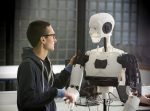Creaform HandySCAN 3D scanner now certified by Airbus
Creaform, leader in portable 3D measurement solutions and engineering services, has had its flagship metrology-grade portable 3D scanner, the HandySCAN 3D, certified by Airbus and will be added to the company’s next Technical Equipment Manual (TEM) release. This certification comes following the recognition of HandySCAN 3D’s specifications by the French National Laboratory for Metrology & Testing (LNE). Combined with Creaform’s powerful and easy-to-use VXelements software, the scanner can reduce measurement times by up to 80% compared traditional methods. * Metrology-grade measurements for aircraft maintenance: Users can digitise dent damage on metallic parts with the accuracy of up to 0.030 mm (0.0012 in.) and a resolution of up to 0.050 mm (0.002 in.) with high repeatability and traceable certificate. * Intuitive pass/fail testing: With its intuitive design and real-time software visualization, the 3D scanner ensures ultra-short learning curves so operators can get the critical information they need to regardless of their experience levels. All they have to do is point and shoot! * Real-time visualisation and portability: Because it is so light and small, it can be used in any work environment, such as a hangar or outdoors, as it adapts to ambient and tarmac lighting. Users can easily perform 3D surface inspection of any part of an aircraft—including on and under wings. This certification by an industry leader like Airbus symbolises Creaform’s commitment to helping the aerospace as much as the automotive industries address their high-level of GD&T (Geometric Dimensioning and Tolerancing) requirements. With this certification, more and more industry players are turning to Creaform technologies to facilitate and speed up their 3D measurement processes to carry out accurate assessments of aircraft mechanical damage. The goal is to provide user-friendly and highly advanced solutions to get airplanes back in the skies faster and enable airlines to slash the high costs associated with […]









